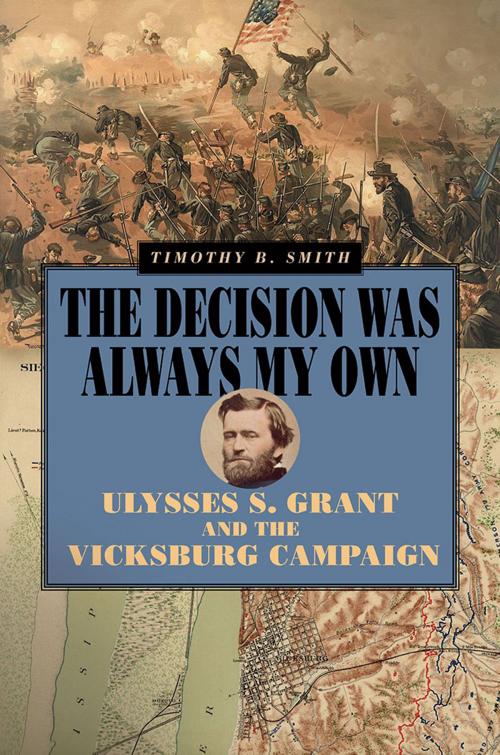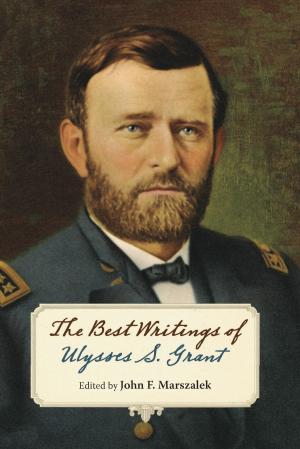The Decision Was Always My Own
Ulysses S. Grant and the Vicksburg Campaign
Nonfiction, History, Americas, United States, Civil War Period (1850-1877), Military| Author: | Timothy B Smith | ISBN: | 9780809336678 |
| Publisher: | Southern Illinois University Press | Publication: | June 20, 2018 |
| Imprint: | Southern Illinois University Press | Language: | English |
| Author: | Timothy B Smith |
| ISBN: | 9780809336678 |
| Publisher: | Southern Illinois University Press |
| Publication: | June 20, 2018 |
| Imprint: | Southern Illinois University Press |
| Language: | English |
The Vicksburg Campaign, argues Timothy B. Smith, is the showcase of Ulysses S. Grant’s military genius. From October 1862 to July 1863, for nearly nine months, Grant tried repeatedly to capture the Confederate river city. He maneuvered and adapted numerous times, reacting to events and enemy movements with great skill and finesse as the lengthy campaign played out on a huge chessboard, dwarfing operations in the east. Grant’s final, daring move allowed him to land an army in Mississippi and fight his way to the gates of Vicksburg. He captured the Confederate garrison and city on July 4, 1863, opening the Mississippi River for the Union.
Showing how and why Grant became such a successful general, Smith presents a fast-paced reexamination of the commander and the campaign. His fresh analysis of Grant’s decision-making process during the Vicksburg maneuvers, battles, and siege details the course of campaigning on military, political, administrative, and personal levels. The narrative is organized around Grant’s eight key decisions: to begin operations against Vicksburg, to place himself in personal charge of the campaign, to begin active operations around the city, to sweep toward Vicksburg from the south, to march east of Vicksburg and cut the railroad before attacking, to assault Vicksburg twice in an attempt to end the campaign quickly, to lay siege after the assaults had failed, and to parole the surrendered Confederate garrison rather than send the Southern soldiers to prison camps.
The successful military campaign also required Grant to master political efforts, including handling Lincoln’s impatience and dealing with the troublesome political general John A. McClernand. Further, he had to juggle administrative work with military decision making. Grant was more than a military genius, however; he was also a husband and a father, and Smith shows how Grant’s family was a part of everything he did.
Grant’s nontraditional choices went against the accepted theories of war, supply, and operations as well as against the chief thinkers of the day, such as Henry Halleck, Grant’s superior. Yet Grant pulled off the victory in compelling fashion. In the first in-depth examination in decades, Smith shows how Grant’s decisions created and won the Civil War’s most brilliant, complex, decisive, and lengthy campaign.
The Vicksburg Campaign, argues Timothy B. Smith, is the showcase of Ulysses S. Grant’s military genius. From October 1862 to July 1863, for nearly nine months, Grant tried repeatedly to capture the Confederate river city. He maneuvered and adapted numerous times, reacting to events and enemy movements with great skill and finesse as the lengthy campaign played out on a huge chessboard, dwarfing operations in the east. Grant’s final, daring move allowed him to land an army in Mississippi and fight his way to the gates of Vicksburg. He captured the Confederate garrison and city on July 4, 1863, opening the Mississippi River for the Union.
Showing how and why Grant became such a successful general, Smith presents a fast-paced reexamination of the commander and the campaign. His fresh analysis of Grant’s decision-making process during the Vicksburg maneuvers, battles, and siege details the course of campaigning on military, political, administrative, and personal levels. The narrative is organized around Grant’s eight key decisions: to begin operations against Vicksburg, to place himself in personal charge of the campaign, to begin active operations around the city, to sweep toward Vicksburg from the south, to march east of Vicksburg and cut the railroad before attacking, to assault Vicksburg twice in an attempt to end the campaign quickly, to lay siege after the assaults had failed, and to parole the surrendered Confederate garrison rather than send the Southern soldiers to prison camps.
The successful military campaign also required Grant to master political efforts, including handling Lincoln’s impatience and dealing with the troublesome political general John A. McClernand. Further, he had to juggle administrative work with military decision making. Grant was more than a military genius, however; he was also a husband and a father, and Smith shows how Grant’s family was a part of everything he did.
Grant’s nontraditional choices went against the accepted theories of war, supply, and operations as well as against the chief thinkers of the day, such as Henry Halleck, Grant’s superior. Yet Grant pulled off the victory in compelling fashion. In the first in-depth examination in decades, Smith shows how Grant’s decisions created and won the Civil War’s most brilliant, complex, decisive, and lengthy campaign.















